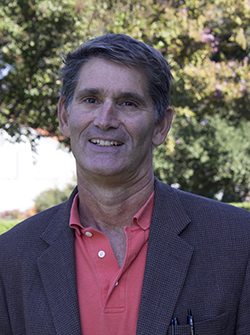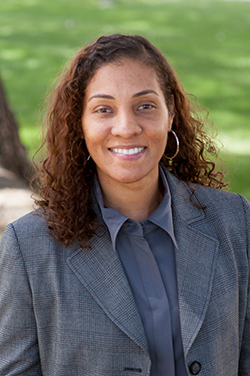A collection of illustrations and encouragements hang on the wall in the Office of Career and Professional Development (OCPD), offering students a dose of confidence when they visit. When the campus is open, Professor of Biology Ben Aronson likes to visit the office to talk with OCPD staff about how he can best integrate career opportunities into his courses. Aronson’s favorite illustration on the office’s wall depicts a curving path accompanied by the saying, “None of this is linear.”

“It gives students the permission to leave the University without a clear, straight and narrow road,” he says. “Plenty of people have found happiness in their careers by taking the winding road.”
This May, Aronson is teaching a professional development course specifically geared toward biology and chemistry students. While it’s the second time he has taught the course, it’s the first time he has built and taught it in an online format. Instead of embarking on a handful of employer visits and inviting alumni into the classroom to speak about their careers, the course now features video conferences with more than 25 alumni who work in varying fields of science and includes virtual tours of facilities.
Similar to the winding road that he hopes students will explore, Aronson’s foray into online teaching has been a rewarding learning experience with important conversations with fellow faculty members.
Aronson is currently the Virginia Hunsaker Chair in Distinguished Teaching, which is a rotating endowed position focused on improving the teaching and learning experiences of faculty and students. Last semester, Aronson organized a handful of luncheons for faculty from all four of the University’s schools to exchange ideas and literature on teaching methods. Now, he says, he’s hosting a virtual meeting every week.
“Suddenly, online learning and teaching are paramount, and there are many people with a lot of questions,” he says. “There is a decent number of faculty members who have expertise and conduct research in the field of online education, and these meetings have become a forum for us to learn from each other.”

Nicol Howard, a professor in the School of Education, has been sharing her expertise in online teaching methods with attendees. A group of faculty members from the School of Business crowdsourced tips for using breakout sessions in Webex to enhance online discussions. Some professors are exploring Microsoft Teams to improve the structure and execution of virtual courses.
In addition to different University resources—such as Webex for video conferencing, Moodle for course design, Kaltura for exploring video content, and Microsoft Teams for collaboration—faculty members rely heavily on the Academic Computing and Instructional Technology Services team to help build their virtual classrooms.
Some courses, such as lab-based science classes and studio art courses, are especially difficult to adapt to an online environment, and Aronson acknowledges the great lengths some of his colleagues have gone to continue to provide a personalized education to U of R students. For example, Senior Lecturer Candy Glendening gave kitchen-based assignments for her class, Mother Earth Chemistry. “She figured out everything that students would need—natural dye to dye fabrics, components for making cheese—all of the items that any student in the course would need, and she mailed them to each student in the course,” he says. “If the student lived in Redlands, the items were delivered to them.” She then used a video format to provide instructions and the Teams platform to address any issues.
Aronson hopes that faculty members will continue to see the value in implementing digital tools and other innovations in order to augment the student experience and use class time in a different way, whether that be through video conferences, robust online discussions, or taking full advantage of online course management systems.
“We really want to get back into the classroom as soon as possible,” he says. “But I hope we will see the benefit of some of the pedagogical approaches we’ve been forced to take as a result of moving courses online and we think about the ways they can assist a brick and mortar class.”
Learn more about the University of Redlands.






